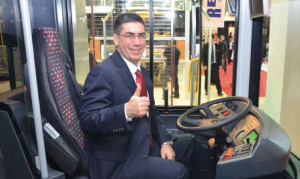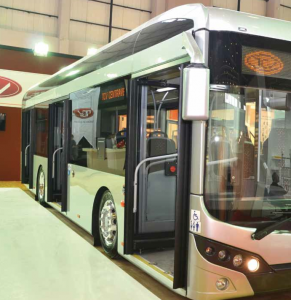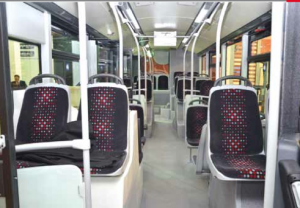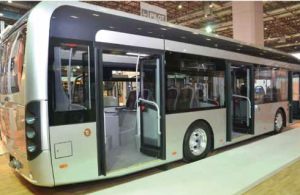Company premieres city-bus Centravel at Busworld
An exclusive report from MOTORINDIA
 A year and a half ago, a group of people in Turkey, with rich experience in the bus industry and strong technical know-how, came together to set up a vehicle manufacturing company. In October 2010, Turkish Commercial Vehicle (TCV) was established as a company involved in design and production activities in the commercial vehicle sector. Recently, TCV made the world premiere of its first city-bus, the Centravel, at Busworld Turkey.
A year and a half ago, a group of people in Turkey, with rich experience in the bus industry and strong technical know-how, came together to set up a vehicle manufacturing company. In October 2010, Turkish Commercial Vehicle (TCV) was established as a company involved in design and production activities in the commercial vehicle sector. Recently, TCV made the world premiere of its first city-bus, the Centravel, at Busworld Turkey.
Originally the team wanted to develop city-buses for the Turkish market. After an initial thought of developing electrical buses, it realised that the market demand for city-buses was far beyond expectations. The municipality in Istanbul and Ankara are the key initial targets for the Centravel, a low-floor city-bus. The Istanbul Municipality would be replacing 2,000 city-buses and 200 private buses in the coming months, a factor which was decisive in TCV changing its initial production plans from electrical to diesel buses.
 The first prototype of the Centravel, which was ready in July 2011, was sent for a one million km durability test. The company was then ready with the chassis and body-structure and completed the pre-serial buses and is currently ready for serial production.
The first prototype of the Centravel, which was ready in July 2011, was sent for a one million km durability test. The company was then ready with the chassis and body-structure and completed the pre-serial buses and is currently ready for serial production.
The Centravel is a 10.7 m low-floor city-bus with three doors that combines the agility and manoeuvrability of a 9.5-metre midi-bus and the capacity of a 12-metre city-bus. The bus meets Euro 5 emission norms and, with its modern design, light weight and, low fuel-consumption is priced very competitively in order to become the preferred choice in the public transportation segment.
Three 10.7 m version of the Centravel have been built so far. The 12 m version will be available for sale in June, while the CNG version will be ready by August this year. Though not the preferred option, CNG buses account for close to 15 to 20 per cent of the total Turkish bus market. TCV also expects to enter the electrical bus market before the end of the current year.
 The Turkish bus market has gone far ahead in terms of technology and product development. Apart from the powertrain, all major vehicle components are manufactured in Turkey, driven by the recent increase in the number of European JV’s in the country. Major bus manufacturers, including Temsa, Otokar and Isuzu, produce around 1,000 buses each annually in a market dominated by the 7.5 m segment.
The Turkish bus market has gone far ahead in terms of technology and product development. Apart from the powertrain, all major vehicle components are manufactured in Turkey, driven by the recent increase in the number of European JV’s in the country. Major bus manufacturers, including Temsa, Otokar and Isuzu, produce around 1,000 buses each annually in a market dominated by the 7.5 m segment.
The Indian connection
Though TCV was established less than two years ago, the company has already identified a suitable partner for collaboration in the Indian market. Mr. Timucin Bayraktar, General Manager, TCV, said, “India is a booming market. We want to localise our buses for which we have the technical know-how and design capabilities while our partner knows to build bodies. We will form a JV and achieve at least 70 to 80 per cent localisation. We haven’t contacted our Indian partner for two months, but now that our world premiere is over, we will get back to the JV.”
 The bus-body building company with which TCV is looking to partner works with leading Indian bus manufacturers like Tata Motors and Ashok Leyland and is also interested in building buses. The collaborative venture, to begun operations in 2013, will initially focus on the city-bus segment. In the coach segment, TCV is looking at shorter tourism buses which are typically 9.5 to 10.5 m long.
The bus-body building company with which TCV is looking to partner works with leading Indian bus manufacturers like Tata Motors and Ashok Leyland and is also interested in building buses. The collaborative venture, to begun operations in 2013, will initially focus on the city-bus segment. In the coach segment, TCV is looking at shorter tourism buses which are typically 9.5 to 10.5 m long.
“India is a huge market where even the body-builders build nearly 5,000 buses per year. If we get into production in India, the number will be much higher. Our Indian investment would depend on many factors and all the products will be branded as TCV. The buses should start rolling out by the second half of 2013”, added Mr. Bayraktar.